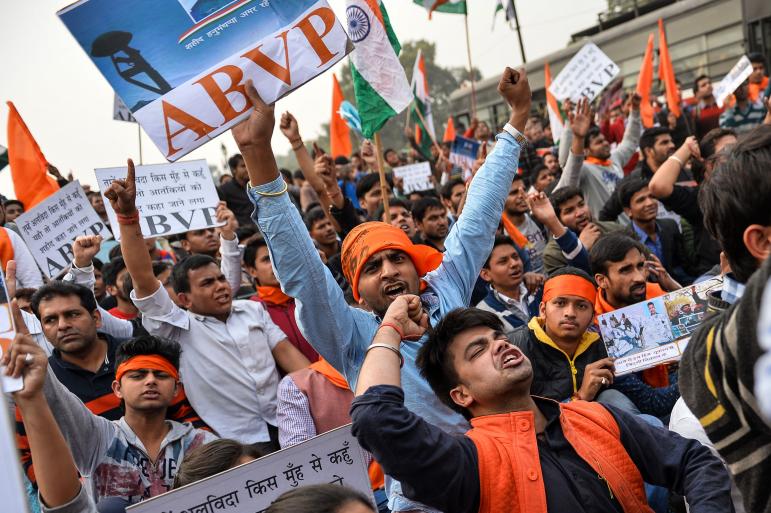
Nearly two years ago, when Indian voters swept Narendra Modi into power, it was all supposed to be about development.![]()
Modi, the former Gujarati first minister, led the Bharatiya Janata Party (the BJP, भारतीय जनता पार्टी) to a dizzying landslide on the promise that he would be the energetic 21st century CEO of India, Inc. He repeatedly emphasized that his administration would prioritize toilets over temples, that a Modi-led government would be far more interested in promoting economic growth, human development and policy reform than in policing the religious norms of the Hindu nationalists so influential in the BJP.
But by the standards of Modi’s own 2014 campaign, he’s failing.
His efforts to enact business-friendly land reform (essentially, giving the Indian government stronger rights to eminent domain) was curtailed by farmers, Rahul Gandhi and even opponents to Modi’s own right flank.
An attempt to enact a Goods and Services Tax bill, which would harmonize a single tax rate across India’s state borders, is also flailing (for now) in the upper house of the Indian parliament. Officially, the economy grew in 2015 by 7.5%, but there’s reason to doubt those numbers.
That makes the latest showdown between Modi and student protesters even more damning — a prosecution of student leader Kanhaiya Kumar and five other students at Delhi’s prestigious Jawaharlal Nehru University for ‘sedition’ after the students led a series of protests against over the 2013 execution of a Kashmiri man charged with a 2001 attack on the Indian parliament.
More than a few critics have criticized the national government’s attack on the principles of free speech against so-called ‘anti-national’ students. Two of the five students have now surrendered to police, though any resulting trial is sure to engage the kind of political capital that Modi can no longer spare on curtailing his critics, who argue that he’s leading India into a new authoritarian phase unseen since Indira Gandhi declared emergency rule from 1975 to 1977.
It’s only the latest in countless examples of cultural battles that have come to define the Modi era. From the government’s ridiculous ham-fisted attempt to block Internet access to 857 porn websites (and its nearly immediate volte-face) to the growing anti-Muslim tenor of the anti-beef movement, whose top achievement has been enacting a beef ban in Maharashtra, a large southern state that’s home to the cosmopolitan city of Mumbai, Modi has allowed Hindu nationalist matters to overshadow his limping efforts at economic reform.
That’s lost the BJP two key elections. Last February, the BJP lost elections in Delhi, ceding the mantle of reform in the Indian capital territory to Arvind Kejriwal. Last November, Nitish Kumar, a one-time BJP ally, defeated the BJP in Bihar’s regional elections. More defeats could follow in even larger states like Tamil Nadu and West Bengal later this year and, more ominously, in Uttar Pradesh, India’s largest state, in 2017.
It’s not that India hasn’t had its own brand of culture wars. Sikh-Hindu tensions led to Indira Gandhi’s 1984 assassination, and the 1992 destruction of a mosque led to some of the worst Muslim-Hindu tensions in post-independence history.
But Modi came to power pledging a future far different, even though Gujarat’s 2002 Hindu-Muslim riots gave Modi his darkest marks in governance just months after taking over state government. Despite misgivings, the corruption, inaction and economic decline that marked the outgoing Congress-led government pushed tens of millions of new voters into the BJP’s arms.
It wasn’t for love of hindutva. It was to deliver, at long last, on the promise of unleashing India’s true potential as a global economic power.
Modi still has a solid majority and three years to revamp those reforms. But the clock is ticking.